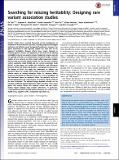Searching for missing heritability: Designing rare variant association studies
Author(s)
Zuk, Or; Schaffner, Stephen F.; Samocha, Kaitlin; Do, Ron; Hechter, Eliana; Kathiresan, Sekar; Daly, Mark J.; Neale, Benjamin M.; Sunyaev, Shamil R.; Lander, Eric Steven; ... Show more Show less
DownloadZuk-2014-Searching for missin.pdf (879.7Kb)
PUBLISHER_POLICY
Publisher Policy
Article is made available in accordance with the publisher's policy and may be subject to US copyright law. Please refer to the publisher's site for terms of use.
Terms of use
Metadata
Show full item recordAbstract
Genetic studies have revealed thousands of loci predisposing to hundreds of human diseases and traits, revealing important biological pathways and defining novel therapeutic hypotheses. However, the genes discovered to date typically explain less than half of the apparent heritability. Because efforts have largely focused on common genetic variants, one hypothesis is that much of the missing heritability is due to rare genetic variants. Studies of common variants are typically referred to as genomewide association studies, whereas studies of rare variants are often simply called sequencing studies. Because they are actually closely related, we use the terms common variant association study (CVAS) and rare variant association study (RVAS). In this paper, we outline the similarities and differences between RVAS and CVAS and describe a conceptual framework for the design of RVAS. We apply the framework to address key questions about the sample sizes needed to detect association, the relative merits of testing disruptive alleles vs. missense alleles, frequency thresholds for filtering alleles, the value of predictors of the functional impact of missense alleles, the potential utility of isolated populations, the value of gene-set analysis, and the utility of de novo mutations. The optimal design depends critically on the selection coefficient against deleterious alleles and thus varies across genes. The analysis shows that common variant and rare variant studies require similarly large sample collections. In particular, a well-powered RVAS should involve discovery sets with at least 25,000 cases, together with a substantial replication set.
Date issued
2014-01Department
Massachusetts Institute of Technology. Department of BiologyJournal
Proceedings of the National Academy of Sciences
Publisher
National Academy of Sciences (U.S.)
Citation
Zuk, O., S. F. Schaffner, K. Samocha, R. Do, E. Hechter, S. Kathiresan, M. J. Daly, B. M. Neale, S. R. Sunyaev, and E. S. Lander. “Searching for Missing Heritability: Designing Rare Variant Association Studies.” Proceedings of the National Academy of Sciences 111, no. 4 (January 28, 2014): E455–E464.
Version: Final published version
ISSN
0027-8424
1091-6490